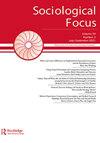Tattoos, Religiosity, and Deviance Among College Students
Q2 Social Sciences
引用次数: 0
Abstract
ABSTRACT For much of U.S. history, tattoos carried a stigma. The perception was that tattoos marked gang members and prisoners, not respectable church-going citizens. In recent decades, tattoos have become mainstream, even for some religious people. We analyze the number and content of tattoos in relationship to religiosity and deviance. We test four hypotheses using survey data from 3,525 students at 12 American colleges and universities, finding that the number of tattoos is largely unrelated to religiosity, but tattoo quantity is associated with binge drinking, marijuana use, and having multiple sexual partners. As expected, students with religious tattoos claim a stronger faith, pray more, and attend religious service more than students with no tattoos or non-religious tattoos. However, both religious tattoos and non-religious tattoos are associated with marijuana use and multiple sexual partners in contrast to those with no tattoos. To conclude, we offer a theory of sensation seeking to explain this irony.纹身、宗教与大学生的偏差
摘要在美国历史的大部分时间里,纹身都带有污名。人们的看法是,纹身标志着帮派成员和囚犯,而不是受人尊敬的去教堂的公民。近几十年来,纹身已经成为主流,甚至对一些宗教人士来说也是如此。我们分析了纹身的数量和内容与宗教信仰和越轨行为的关系。我们使用来自12所美国学院和大学的3525名学生的调查数据测试了四个假设,发现纹身的数量在很大程度上与宗教信仰无关,但纹身的数量与酗酒、吸食大麻和有多个性伴侣有关。不出所料,有宗教纹身的学生比没有纹身或非宗教纹身的人更有信仰,祈祷更多,参加宗教仪式更多。然而,与没有纹身的人相比,宗教纹身和非宗教纹身都与吸食大麻和多个性伴侣有关。最后,我们提出了一种感觉理论来解释这种反讽。
本文章由计算机程序翻译,如有差异,请以英文原文为准。
求助全文
约1分钟内获得全文
求助全文

 求助内容:
求助内容: 应助结果提醒方式:
应助结果提醒方式:


